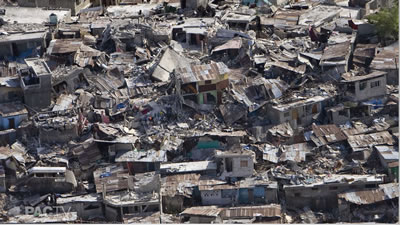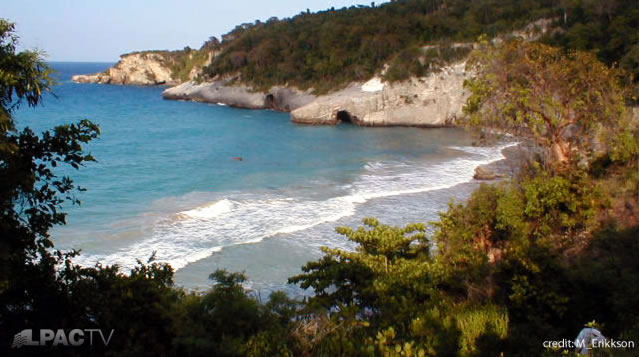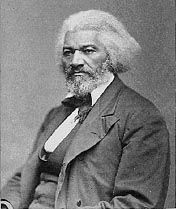Helga Zepp-LaRouche Calls For
"Operation Frederick Douglass"
To Save Haiti
November 2010
 Helga Zepp-LaRouche |
Download audio (click right mouse button)
Let us start to make an international mobilization to save the Haitian people and organize for a full reconstruction of Haiti, so that everybody in this country can have a decent life. And let's call it "Operation Frederick Douglass."
The unfolding catastrophe which is happening in Haiti right now is a mirror of what will happen to the rest of the planet if the attitude towards this beautiful country is not changed dramatically. When the earthquake happened, 10 months ago, and no significant aid has been sent in the meantime, instead you have cholera and a shootout between demonstrators and soldiers. In February, Lyndon LaRouche made an urgent call to send the U.S. Army Corps of engineers and work with the Haitian government to relocate the 1.3 million homeless people, and he stressed very emphatically that this had to occur before the rainy season or else there would be the danger of floods, mudslides, and the deadly sewage for 1.5 million people. Haiti did not have one single sewage treatment plant at that time, and LaRouche said if one does not act immediately, soon there would be the danger of dengue fever, cholera, typhoid and other plagues.
And LaRouche called on the US President to act. In a webcast question on January 30th, he said in his answer that the United States has to take the approach to Haiti of Presidents like Lincoln and Franklin D. Roosevelt. That not many countries should come in, but that it was important to respect the sovereignty of Haiti, and that, therefore, the United States must make a treaty arrangement with Haiti to re-establish full sovereignty after the aid and reconstruction of the country has been fulfilled. The call of Lyndon LaRouche was supported at that time by many medical and military professionals on the ground. It was turned down explicitly by President Barack Obama, who pulled out the military, and so therefore, one can say very clearly that he has the moral responsibility of what is now the situation in Haiti.
On the 24th of March, Bill Clinton, who at that time was US special envoy to Haiti, made an urgent appeal to move the people sitting in the camps to higher ground, or else there would be the danger of many tens of thousands endangered to die. Again, there was no response from the US President. On the 25th of October, after the cholera had broken out, LaRouche issued an urgent statement saying: It is still not too late to save hundreds of thousands of lives. That the Obama administration should immediately return the US military to Haiti and coordinate emergency provisions of clean water supplies, a mass relocation out of the disease-infected hellholes for 1.5 million people and stop the 10-month period of complete negligence. As of October, 1.3 million people were still in temporary camps, 40% had no access to clean water, 30% have no toilet at all, and the average number of people sharing one toilet in Port-au-Prince is 273. Only 10% of families have tents, and not one cent of the 1.15 billion dollars pledged by the US government has been sent.
Now you have cholera and chronic infections, malnutrition, hunger and many, many people who are suffering from an untreated psychological trauma. The present horrifying condition of the victims in Haiti are a total indictment of the US administration and the international community, a catastrophe which was visible for so long and predictable that it would happen, like the present cholera catastrophe.
Not acting when you can, amounts to genocide.
The actual aid given, maybe at most 1 billion dollars, and not the 10 billion pledged; compare that to the 30 trillion dollar bailout packages for speculation, for high-risk speculation in investment banks and hedge funds. If you compare this, it is very clear that Haiti will be the fate of the rest of the world if this attitude is not changed.
 Earthquake, San Francisco, California, October 1989. |
 View full size Earthquake, Port-au-Prince, Haiti, January 2010. |
The situation in Haiti is no natural disaster. In October 1989, San Francisco had a similar earthquake, of a similar magnitude, namely 7 on the Richter scale. At that point, you had 63 people dead, 3,000 wounded and 12,000 homeless. In Haiti, it was 300,000 deaths and 1.5 million people homeless.
Now this is all due to a lack of infrastructure and the lack of a solid foundation of urban development. Therefore, the reconstruction of Haiti has to build up infrastructure, cities, industries, and agriculture. And this has to occur in the context of building the NAWAPA and PLHINO water management projects. It has to be in the context of building the world land-bridge as the reconstruction after the collapse of the present system. And we have to think in terms of 25 years of development, of one generation of development for Haiti. And we have to have a solemn commitment to do that. We should call it: "Operation Frederick Douglass," because there is no better name to give Haiti a better future.
Haiti declared independence on the 1st of January, 1804. This was the first successful rebellion of slaves in the Americas, which occurred after the American revolution, and defeated the military of the colonial powers of Spain, England and Napoleonic France. And since that time, the fate and history of Haiti has been extremely closely connected to that of the United States. Haiti supported the American revolution and was allied with Alexander Hamilton. Haiti was punished for this through blockades and quarantines. This was changed again when Lincoln became President in the 1860s, and then the US finally diplomatically recognized Haiti. At that time, Frederick Douglass became the plenipotentiary to Haiti.
With Woodrow Wilson, this changed again to the worse, and Haiti was invaded and occupied from 1915, through a brutal occupation until 1934. Franklin D. Roosevelt ended that occupation and started the Good Neighbor era. With the death of Franklin D. Roosevelt, the situation worsened again. And you can see that the situation in Haiti for more than 200 years, has been the direct reflection if the US identity was that of the American Revolution and Constitution and Declaration of Independence, or if the American identity was that of a de facto British colony, and guided by the so-called special relationship between US and Great Britain acting as an empire.
Now let's take the horrifying pictures of the people dying in the hell holes in Port-au-Prince right now. These pictures should haunt those who are responsible for this totally unnecessary catastrophe. President Obama should look at these pictures, long and thoughtfully, and so should every speculator in high-risk speculation do likewise. And if President Obama cannot develop the empathy with the suffering and immediately contact the government of Haiti and offer a treaty arrangement and deploy the Corps of Engineers; if he cannot develop that empathy, where he is clearly in the unique position to help, then he should immediately make place for a President who can.
Let's mobilize for "Operation Frederick Douglass," and let's make that the first cause of an international alliance for development until Haiti is saved and rebuilt. And let me end this message with a quote from a speech which Frederick Douglass gave on January 2, 1893:
"In the nature of the country itself there is much to inspire its people with manliness, courage and self-respect. In its topography it is wonderfully beautiful, grand and impressive. Clothed in its blue and balmy atmosphere it rises from the surrounding sea in surpassing splendor...
 Haitian coast. |
"It is a land strikingly beautiful, diversified by mountains, valleys, lakes, rivers and plains, and contains in itself all of the elements of great and enduring wealth. Its limestone formation and foundation are a guarantee of perpetual fertility. Its tropical heat and insular moisture keep its vegetation fresh, green and vigorous all the year round. At an altitude of eight thousand feet, its mountains are still covered with woods of great variety and of great value. Its climate, varying with altitude like that of California, is adapted to all constitutions and productions.
"Fortunate in its climate and soil, it is equally fortunate in its adaptation to commerce. Its shore line is marked with numerous indentations of inlets, rivers, bays and harbors, where every grade of vessel may anchor in safety. Bulwarked on either side by lofty mountains rich with tropical verdure from base to summit, its blue waters dotted here and there with the white wings of commerce from every land and sea, the Bay of Port au Prince almost rivals the far-famed Bay of Naples, the most beautiful in the world."
Now let us make the promise that that will be the future of Haiti in the near future, again.
Frederick Douglass: Haiti, "Lives Proudly in the glory of her
bravely-won liberty and blood-bought independence...
Like the
star of the North, she will shine on, shine on forever."
 Frederick Douglass |
On January 2, 1893, the anniversary of Haiti's 1804 independence, Frederick Douglass, former Consul General to that nation, adressed an audience of 1,500 people in Chicago. Here are excerpts of that speech. Emphasis is in the original.
No man should presume to come before an intelligent American audience without a commanding object and an earnest purpose. In whatever else I may be deficient, I hope I am qualified, both in object and purpose, to speak to you this evening. My subject is Haiti, the Black Republic; the only self-made Black Republic in the world. I am to speak to you of her character, her history, her importance and her struggle from slavery to freedom and to statehood. I am to speak to you of her progress in the line of civilization; of her relation with the United States; of her past and present; of her probable destiny; and of the bearing of her example as a free and independent Republic, upon what may be the destiny of the African race in our own country and elsewhere.
...There are many reasons why a good understanding should exist between Haiti and the United States. Her proximity; her similar government and her large and increasing commerce with us, should alone make us deeply interested in her welfare, her history, her progress and her possible destiny.
Haiti is a rich country. She has many things which we need and we have many things which she needs. Intercourse between us is easy. Measuring distance by time and improved steam navigation, Haiti will one day be only three days from New York and thirty-six hours from Florida; in fact our next door neighbor. On this account, as well as others equally important, friendly and helpful relations should subsist between the two countries...
Now, notwithstanding this plain possibility, it is a remarkable and lamentable fact, that while Haiti is so near us and so capable of being so serviceable to us... she is the one country to which we turn the cold shoulder.
...A deeper reason for coolness between the countries is this: Haiti is black, and we have not yet forgiven Haiti for being black [applause] or forgiven the Almighty for making her black. [Applause.] In this enlightened act of repentance and forgiveness, our boasted civilization is far behind all other nations. [Applause.] In every other country on the globe a citizen of Haiti is sure of civil treatment... Besides, after Haiti had shaken off the fetters of bondage, and long after her freedom and independence had been recognized by all other civilized nations, we continued to refuse to acknowledge the fact and treated her as outside the sisterhood of nations.
No people would be likely soon to forget such treatment and fail to resent it in one form or another. [Applause.] Not to do so would justly invite contempt. In the nature of the country itself there is much to inspire its people with manliness, courage and self-respect. In its typography it is wonderfully beautiful, grand and impressive. Clothed in its blue and balmy atmosphere it rises from the surrounding sea in surpassing splendor... It is a land strikingly beautiful, diversified by mountains, valleys, lakes, rivers and plains, and contains in itself all the elements of great and enduring wealth...
No other land has brighter skies. No other land has purer water, richer soil, or a more happily diversified climate. She has all the natural conditions essential to a noble, prosperous and happy country. [Applause.] Yet, there she is, torn and rent by revolutions, by clamorous factions and anarchies...The fault is not with the ignorant many, but with the educated and ambitious few. Too proud to work, and not disposed to go into commerce, they make politics a business of their country...
...While representing the United States in Haiti, I was repeatedly charged in certain quarters, with being a friend to Haiti. I am not ashamed of that charge. I own at once, that the charge is true, and I would be ashamed to have it otherwise than true...
From the beginning of our century until now, Haiti and its inhabitants under one aspect or another, have, for various reasons, been very much in the thoughts of the American people. While slavery existed amongst us, her example was a sharp thorn in our side and a source of alarm and terror. She came into the sisterhood of nations through blood. She was described at the time of her advent, as a very hell of horrors. Her very name was pronounced with a shudder. She was a startling and frightful surprise and a threat to all slave-holders throughout the world, and the slave-holding world has had its questioning eye upon her career ever since...
In thinking of Haiti, a painful, perplexing and contradictory fact meets us at the outset. It is: that negro slavery was brought to the New World by the same people from whom Haiti received her religion and her civilization. No people have ever shown greater religious zeal or have given more attention to the ordinances of the Christian church than have the Spaniards; yet no people were ever guilty of more injustice and blood-chilling cruelty to their fellow men than these same religious Spaniards... These Spanish Christians found in Haiti a million of harmless men and women, and in less than sixty years they had murdered nearly all of them. With religion on their lips, the tiger in their hearts and the slave whip in their hands, they lashed these innocent natives to toil, death and extinction. When these pious souls had destroyed the natives, they opened the slave trade with Africa as a merciful device.
...The conditions in which the Republican Government of Haiti originated, were peculiar. The great fact concerning its people, is, that they were negro slaves and by force conquered their masters and made themselves free and independent...
I have, since my return to the United States, been pressed on all sides to foretell what will be the future of Haiti-whether she will ever master and subdue the turbulent elements within her borders and become an orderly Republic. Whether she will maintain her liberty and independence, or, at last, part with both and become a subject of some one or another of the powerful nations of the world by which she seems to be coveted. The question still further is, whether she will fall away into anarchy, chaos and barbarism, or rise to the dignity and happiness of a highly civilized nation and be a credit to the colored race? I am free to say that I believe she will fulfill the latter condition and destiny...
Plainly enough; we should take no snap judgment on a question so momentous... We should view her in the light broad light of her whole history, and observe well her conduct in the various vicissitudes through which she has passed. Upon such broad view I am sure Haiti will be vindicated.
It was once said by the great Daniel O'Connell, that the history of Ireland might be traced, like a wounded man through a crowd, by the blood. The same may be said of the history of Haiti as a free state. Her liberty was born in blood, cradled in misfortune, and has lived more or less in a storm of revolutionary turbulence. It is important to know how she behaved in these storms. As I view it, there is one great fundamental and soul-cheering fact concerning her. It is this: Despite all the trying vicissitudes of her history, despite all the machinations of her enemies at home, in spite of all temptations from abroad, despite all her many destructive revolutions, she has remained true to herself, true to her autonomy, and still remains a free and independent state. No power on this broad earth has yet induced or seduced her to seek a foreign protector, or has compelled her to bow her proud neck to a foreign government. We talk of assuming protectorate over Haiti. We had better not attempt it... In whatever may be the sources of her shame and misfortune, she has one source of great complacency; she lives proudly in the glory of her bravely won liberty and her blood bought independence, and no hostile foreign foot has been allowed to tread her scared soil in peace from the hour of her independence until now. Her future autonomy is at least secure. [Applause]...
...I can speak of her, not only words of admiration, but words of gratitude as well. She has grandly served the cause of universal human liberty. We should not forget that the freedom you and I enjoy to-day; that the freedom that eight hundred thousand colored people enjoy in the British West Indies; the freedom that has come to the colored race the world over, is largely due to the brave stand taken by the black sons, of Haiti ninety years ago. When they struck for freedom, they builded better than they knew. Their swords were not drawn and could not be drawn simply for themselves alone. They were linked and interlinked with their race, and striking for their freedom, they struck for the freedom of every black man in the world. [Prolonged applause.]
It is said of ancient nations, that each had its special mission in the world and that each taught the world some important lesson. The Jews taught the world a religion, a sublime conception of the Deity. The Greeks taught the world philosophy and beauty. The Romans taught the world jurisprudence. England is foremost among the modern nations in commerce and manufactures. Germany has taught the world to think, while the American Republic is giving the world an example of a Government by the people, of the people and for the people. [Applause.] Among these large bodies, the little community of Haiti, anchored in the Caribbean Sea, has had her mission in the world, and a mission which the world had much need to learn. She has taught the world the danger of slavery and the value of liberty. In this respect she has been the greatest of all our modern teachers...
...Until Haiti struck for freedom, the conscience of the Christian world slept profoundly over slavery. It was scarcely troubled even by a dream of this crime against justice and liberty. The Negro was in its estimation a sheep like creature, having no rights which white men were bound to respect, a docile animal, a kind of ass... The mission of Haiti was to dispel this degradation and dangerous delusion, and to give to the world a new and true revelation of the black man's character. This mission she has performed and performed it well. [Applause.] ...
In forecasting the future of this people, then, I insist that some importance shall be given to this and to another grand initial fact: that the freedom of Haiti was not given as a boon, but conquered as a right ! [Applause.] Her people fought for it. They suffered for it, and thousands of them endured the most horrible tortures, and perished for it. It is well said that a people to whom freedom is given can never wear it as grandly as can they who have fought and suffered to gain it. Here, as elsewhere, what comes easily, is liable to go easily. But what man will fight to gain, that, man will fight to maintain. To this test Haiti was early subjected, and she stood this test like pure gold. [Applause.]
...Haiti has in the past, raised many learned, able and patriotic men. She has made wise laws for own government. Among her citizens she has had scholars and statesmen, learned editors, able lawyers and eminent physicians. She has now, men of education in the church and in her government, and she is now, as ever, in the trend of civilization. She may be slow and halting in the race, but her face is in the right direction. [Applause.]
The statement that she is on the down grade to barbarism is easily made, but hard to sustain. It is not all borne out by my observation and experience while in that country...
It should also be remembered that Haiti is still in her childhood. Give her time! Give her time!! While eighty years may be a good old age for a man, it can only be as a year in the life of a nation. With a people beginning a national life as Haiti did, with such crude material within, and such antagonistic forces operating upon her from without, the marvel is, not that she is far in the rear of civilization, but that she has survived in any sense as a civilized nation.
...In the face of such facts; in the face of the fact that Haiti still lives, after being boycotted by all the Christian world; in the face of the fact of her known progress within the last twenty years in the face of the fact that she has attached herself to the car of the world's civilization, I will not, I cannot believe that her star is to go out in darkness, but I will rather believe that whatever may happen of peace or war Haiti will remain in the firmament of nations, and, like the star of the north, will shine on and shine on forever. [Prolonged applause.]
Related pages:
